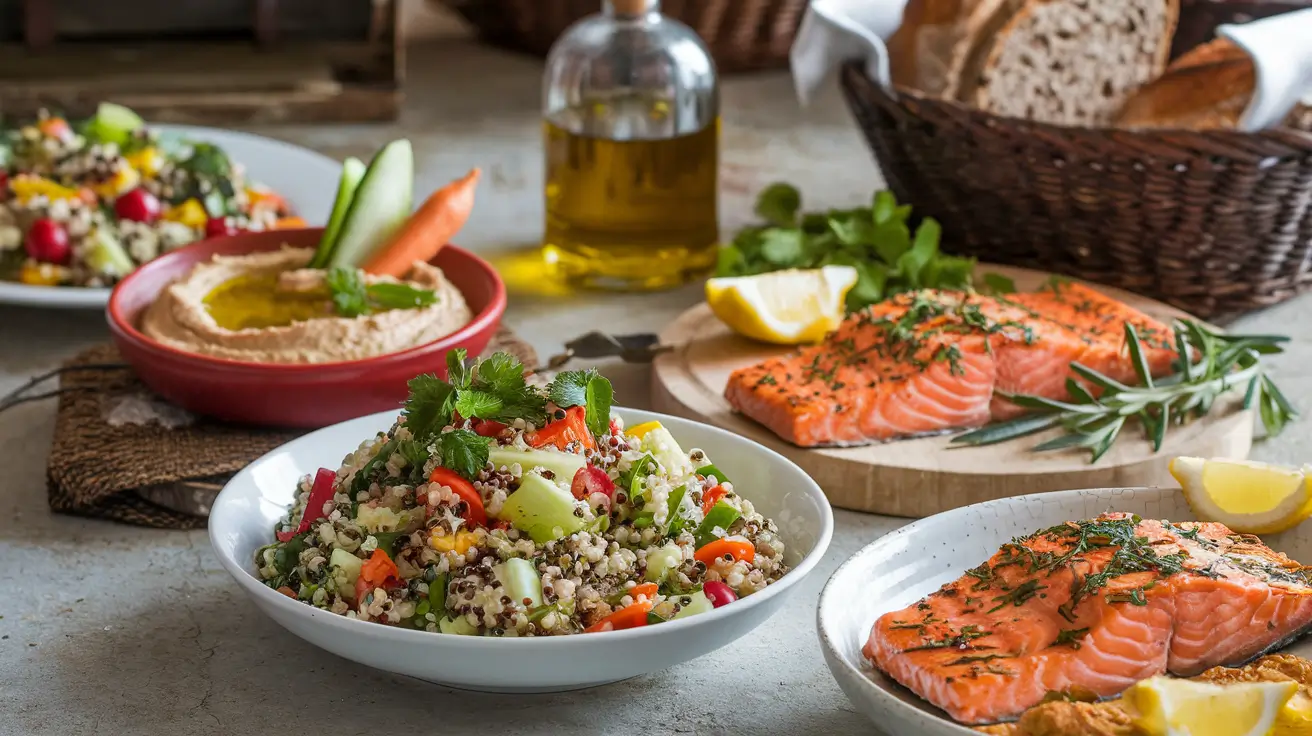Healthy and Delicious: A Curated Collection of Mediterranean Diet Recipes

Imagine savoring a plate of grilled fish drizzled with olive oil, accompanied by a colorful array of roasted vegetables and a slice of crusty whole grain bread. This isn’t just a delicious meal – it’s a glimpse into the heart of the Mediterranean diet, a way of eating that’s been capturing the attention of health enthusiasts and food lovers alike.
The Mediterranean diet has gained immense popularity in recent years, and for good reason. It’s not just a diet; it’s a lifestyle that emphasizes whole foods, healthy fats, fresh vegetables, lean proteins, and grains. But what truly sets it apart is its ability to combine incredible flavors with impressive health benefits.
In this post, we’ll take you on a culinary journey through the Mediterranean. We’ll explore what makes this diet so special, dive into its numerous health benefits, and most importantly, share a curated collection of mouthwatering Mediterranean-inspired recipes. From breakfast to dinner (and even a guilt-free dessert!), we’ve got you covered. Plus, we’ll provide tips on how to seamlessly incorporate these meals into your everyday life for better health and vitality.
So, whether you’re a seasoned Mediterranean diet enthusiast or a curious newcomer, get ready to transform your plate – and potentially your health – with these delicious Mediterranean delights!
What is the Mediterranean Diet?
The Mediterranean diet is more than just a way of eating – it’s a lifestyle inspired by the traditional eating habits of people living in countries bordering the Mediterranean Sea, such as Greece, Italy, and Spain. Let’s break down its key principles:
- Emphasis on Whole Foods: At its core, the Mediterranean diet focuses on fresh, minimally processed ingredients. This means plenty of vegetables, fruits, whole grains, nuts, and legumes. These foods form the foundation of most meals, providing a wealth of nutrients, fiber, and natural flavors.
- Healthy Fats: One of the standout features of the Mediterranean diet is its emphasis on healthy fats, particularly olive oil. This liquid gold replaces less healthy options like saturated and trans fats, contributing to heart health and adding a delicious flavor to dishes.
- Lean Proteins and Seafood: Fish and seafood take center stage as the primary sources of animal protein, consumed at least twice a week. Poultry, eggs, and dairy appear in moderate amounts, while red meat is limited to occasional consumption.
- Herbs and Spices: Mediterranean cuisine is known for its bold, vibrant flavors. This comes from the liberal use of herbs and spices, which not only make food tasty but also reduce the need for excess salt or artificial additives.
- Social and Lifestyle Elements: The Mediterranean diet isn’t just about what’s on your plate – it’s about how you eat too. It emphasizes the importance of enjoying meals with family and friends, practicing mindful eating, and staying physically active.
Remember, the Mediterranean diet is more of a general eating pattern than a strict set of rules. It’s flexible, enjoyable, and most importantly, sustainable – key factors that contribute to its effectiveness and popularity.
Health Benefits of the Mediterranean Diet
The Mediterranean diet isn’t just delicious – it’s also backed by science as one of the healthiest ways to eat. Here’s a deeper look at some of its impressive health benefits:
- Heart Health:
- The diet’s emphasis on healthy fats (particularly omega-3s from fish and monounsaturated fats from olive oil) helps reduce bad cholesterol levels and increase good cholesterol.
- High fiber intake from whole grains, fruits, and vegetables helps lower blood pressure and reduce the risk of heart disease.
- Studies have shown that following a Mediterranean diet can reduce the risk of heart disease by up to 30%.
- Weight Management:
- Despite being rich in healthy fats, the Mediterranean diet can aid in weight loss or maintenance.
- The diet is naturally balanced and filling, thanks to its high fiber content and focus on whole foods.
- It promotes sustainable weight loss without the need for calorie counting or restrictive eating.
- Diabetes Prevention and Management:
- The diet’s emphasis on whole grains, legumes, and healthy fats helps regulate blood sugar levels.
- It improves insulin sensitivity, making it an excellent choice for those with type 2 diabetes or at risk of developing it.
- Some studies suggest that the Mediterranean diet may reduce the risk of developing type 2 diabetes by up to 52%.
- Longevity and Well-Being:
- People in Mediterranean regions often live longer, healthier lives, a phenomenon attributed to both the diet and the overall lifestyle.
- The diet is rich in antioxidants, which help protect cells from damage and may slow the aging process.
- It’s associated with a reduced risk of several chronic diseases, potentially contributing to a longer, healthier life.
- Reduced Inflammation:
- The Mediterranean diet is naturally anti-inflammatory, thanks to its high content of antioxidants, omega-3 fatty acids, and fiber.
- This can help reduce the risk and symptoms of inflammatory conditions like arthritis and autoimmune diseases.
- Some studies suggest it may even help reduce the risk of certain types of cancer.
- Brain Health:
- The diet’s high content of healthy fats, particularly omega-3s, supports brain health and may reduce the risk of cognitive decline.
- Some research suggests that following a Mediterranean diet may reduce the risk of Alzheimer’s disease and improve cognitive function in older adults.
- Gut Health:
- The diet’s high fiber content and emphasis on plant-based foods promote a healthy gut microbiome.
- A healthy gut is linked to better digestion, stronger immunity, and even improved mood and mental health.
Remember, these benefits come from following the Mediterranean diet as a whole, rather than focusing on individual components. It’s the synergy of all these healthy foods and lifestyle factors that makes this diet so powerful for overall health and well-being.
Curated Mediterranean Diet Recipes
Now that we understand the principles and benefits of the Mediterranean diet, let’s dive into some delicious recipes that bring these concepts to life. From breakfast to dinner (and even dessert!), these recipes will help you embrace the Mediterranean way of eating.
Breakfast: Mediterranean Veggie Omelette
Start your day with a protein-packed, veggie-filled omelette that’s bursting with Mediterranean flavors.
Ingredients:
- 2 eggs
- 1/4 cup chopped spinach
- 1/4 cup diced tomatoes
- 1/4 cup chopped bell peppers
- 1 tablespoon olive oil
- Salt and pepper to taste
- Fresh parsley for garnish
Instructions:
- Heat olive oil in a skillet over medium heat.
- Add the spinach, tomatoes, and bell peppers, and sauté for 3-4 minutes until soft.
- Whisk the eggs in a bowl with a pinch of salt and pepper, then pour them into the skillet.
- Cook until the eggs are set, then fold the omelette in half and garnish with parsley.
Tip: Serve with a slice of whole-grain toast drizzled with olive oil for a balanced meal.
Lunch: Quinoa Salad with Chickpeas and Feta
This protein-rich salad is perfect for a light yet satisfying lunch that will keep you energized throughout the day.
Ingredients:
- 1 cup cooked quinoa
- 1/2 cup canned chickpeas, rinsed
- 1/4 cup crumbled feta cheese
- 1/4 cup cherry tomatoes, halved
- 1/4 cucumber, diced
- 2 tablespoons olive oil
- 1 tablespoon lemon juice
- Salt and pepper to taste
- Fresh basil for garnish
Instructions:
- In a large bowl, combine the cooked quinoa, chickpeas, feta, tomatoes, and cucumber.
- In a small bowl, whisk together olive oil, lemon juice, salt, and pepper.
- Pour the dressing over the salad, toss to combine, and garnish with fresh basil.
Tip: For extra protein, add grilled chicken or shrimp.
Dinner: Grilled Salmon with Lemon and Herbs
This omega-3 rich dish is a Mediterranean diet staple that’s both healthy and delicious.
Ingredients:
- 4 salmon fillets
- 2 tablespoons olive oil
- Juice of 1 lemon
- 2 cloves garlic, minced
- 1 tablespoon fresh dill, chopped
- Salt and pepper to taste
Instructions:
- Preheat the grill to medium-high heat.
- In a small bowl, mix together olive oil, lemon juice, garlic, dill, salt, and pepper.
- Brush the mixture over the salmon fillets and let them marinate for 10-15 minutes.
- Grill the salmon for 4-5 minutes per side, or until cooked through and flaky.
- Serve with a side of grilled vegetables or a fresh Greek salad.
Tip: Salmon is rich in omega-3s, making this dish perfect for heart health.
Snack: Mediterranean Hummus with Veggies
This protein-packed snack is perfect for satisfying mid-day hunger while staying true to Mediterranean diet principles.
Ingredients:
- 1 can chickpeas, drained and rinsed
- 1/4 cup tahini
- Juice of 1 lemon
- 2 tablespoons olive oil
- 1 clove garlic
- Salt and pepper to taste
- Sliced cucumbers, carrots, and bell peppers for dipping
Instructions:
- In a food processor, combine the chickpeas, tahini, lemon juice, olive oil, garlic, salt, and pepper.
- Blend until smooth, adding water if necessary to achieve the desired consistency.
- Serve with fresh vegetable slices for dipping.
Tip: Hummus can also be used as a spread on whole-grain wraps or pita bread.
Dessert: Greek Yogurt with Honey and Walnuts
Who says you can’t have dessert on the Mediterranean diet? This simple yet satisfying treat proves otherwise.
Ingredients:
- 1 cup plain Greek yogurt
- 1 tablespoon honey
- 2 tablespoons chopped walnuts
- A sprinkle of cinnamon (optional)
Instructions:
- Spoon the Greek yogurt into a bowl.
- Drizzle honey over the top and sprinkle with chopped walnuts and cinnamon.
- Enjoy as a satisfying and healthy dessert or snack.
Tip: This dessert is packed with protein and healthy fats, making it a perfect guilt-free indulgence.
Tips for Sticking to the Mediterranean Diet
Adopting the Mediterranean diet doesn’t have to be a drastic change. Here are some practical tips to help you incorporate Mediterranean diet principles into your everyday life:
- Cook with Olive Oil: Replace butter or vegetable oils with extra virgin olive oil. Use it for cooking, drizzling over salads, or as a dip for bread.
- Focus on Plant-Based Foods: Make vegetables, legumes, and whole grains the star of your meals. Aim to fill at least half your plate with these foods at each meal.
- Eat More Fish: Try to include fish in your diet at least twice a week. Fatty fish like salmon, sardines, and mackerel are excellent choices for boosting your omega-3 intake.
- Add Herbs and Spices: Experiment with fresh herbs and spices to add flavor to your dishes. This can help reduce your reliance on salt for seasoning.
- Snack on Nuts and Seeds: Keep a variety of unsalted nuts and seeds on hand for quick, nutritious snacks.
- Choose Whole Grains: Opt for whole grain bread, pasta, and rice instead of refined grains.
- Limit Red Meat: Try to reduce your red meat consumption to a few times a month, replacing it with fish, poultry, or plant-based proteins.
- Enjoy Fruits for Dessert: Instead of sugary desserts, try having fresh fruit as a sweet treat after meals.
- Drink Water: Make water your primary beverage. If you drink alcohol, red wine in moderation is typical in the Mediterranean diet.
- Enjoy Meals with Others: The Mediterranean diet emphasizes not only what you eat but also how you eat. Take time to enjoy meals with family and friends in a relaxed setting.
Remember, the goal is progress, not perfection. Start by implementing one or two of these tips and gradually incorporate more as you become comfortable with the changes.
Serving Suggestions
To help you create balanced Mediterranean-style meals, here are some serving suggestions for each of our recipes:
- Mediterranean Veggie Omelette:
- Serve with a slice of whole grain toast drizzled with olive oil
- Add a side of fresh fruit like berries or sliced melon
- Pair with a small Greek yogurt for extra protein
- Quinoa Salad with Chickpeas and Feta:
- Serve in a whole wheat pita pocket for a portable lunch
- Add grilled chicken or shrimp for extra protein
- Pair with a small bowl of tomato soup for a hearty meal
- Grilled Salmon with Lemon and Herbs:
- Serve with a side of roasted Mediterranean vegetables (like zucchini, eggplant, and bell peppers)
- Add a small portion of whole grain couscous or brown rice
- Include a simple Greek salad on the side
- Mediterranean Hummus with Veggies:
- Serve with whole grain crackers or pita chips in addition to fresh veggies
- Add a handful of olives for an extra Mediterranean touch
- Pair with a small glass of red wine for an evening appetizer
- Greek Yogurt with Honey and Walnuts:
- Top with fresh berries or sliced peaches for added nutrients and flavor
- Sprinkle with a bit of granola for extra crunch
- Serve alongside a cup of herbal tea for a relaxing dessert
Remember, the Mediterranean diet is all about balance and enjoyment. Feel free to mix and match these suggestions to create meals that you truly love and look forward to eating.
Conclusion
The Mediterranean diet is more than just a way of eating – it’s a delicious journey towards better health and a more satisfying relationship with food. From the vibrant flavors of fresh vegetables and herbs to the rich goodness of olive oil and seafood, this diet proves that eating well doesn’t mean sacrificing taste.
We’ve explored the principles of the Mediterranean diet, delved into its numerous health benefits, and shared a collection of recipes that bring these concepts to life. From a protein-packed veggie omelette to start your day, to a heart-healthy grilled salmon for dinner, and even a guilt-free yogurt dessert, these recipes show how varied and satisfying the Mediterranean diet can be.
Remember, the beauty of this diet lies in its flexibility and focus on whole, minimally processed foods. Don’t be afraid to experiment with different ingredients, try new herbs and spices, or put your own spin on these recipes. The most important thing is to enjoy your food, savor your meals, and share them with loved ones whenever possible.
As you embark on your Mediterranean diet journey, keep in mind that small, consistent changes can lead to significant health improvements over time. Start by incorporating one or two Mediterranean-inspired meals into your week, and gradually increase from there.
We’d love to hear about your experiences with the Mediterranean diet! Have you tried any of these recipes? Do you have your own Mediterranean-inspired creations to share? Leave a comment below and join the conversation. Here’s to your health, happiness, and many delicious Mediterranean meals to come!
FAQ Section
Q: Can I follow the Mediterranean diet if I’m vegetarian?
A: Absolutely! The Mediterranean diet is very plant-forward and can easily be adapted for vegetarians. Focus on legumes, whole grains, nuts, seeds, and plenty of fruits and vegetables. You can also include dairy and eggs if you eat them. Just be sure to pay attention to your protein intake and consider consulting with a nutritionist to ensure you’re meeting all your nutritional needs.
Q: Is the Mediterranean diet good for weight loss?
A: Yes, the Mediterranean diet can be effective for weight loss. It’s naturally balanced and rich in fiber, which helps you feel full and satisfied. Plus, it emphasizes whole foods over processed ones. However, remember that portion control is still important, especially with calorie-dense foods like olive oil [Previous content remains the same]
and nuts. As with any diet, combining it with regular physical activity will enhance your weight loss efforts.
Q: What are the best sources of protein on the Mediterranean diet?
A: The Mediterranean diet includes a variety of protein sources:
- Fish and seafood: Aim for at least two servings per week, especially fatty fish like salmon, sardines, and mackerel.
- Poultry: Chicken and turkey are good options, consumed in moderation.
- Eggs: Enjoy them a few times a week.
- Legumes: Beans, lentils, and chickpeas are excellent plant-based protein sources.
- Nuts and seeds: These provide protein along with healthy fats.
- Dairy: Greek yogurt and small amounts of cheese are common in the Mediterranean diet.
Remember, red meat is consumed sparingly in this diet.
Q: How much olive oil should I use each day?
A: The Mediterranean diet recommends using olive oil as the primary source of added fat. While there’s no strict daily limit, most studies on the Mediterranean diet use about 4 tablespoons (60 ml) per day. This includes oil used for cooking and dressing salads. However, remember that olive oil is calorie-dense, so if you’re trying to lose weight, you might want to limit it to 2-3 tablespoons per day.
Q: Can I have dairy on the Mediterranean diet?
A: Yes, dairy is included in the Mediterranean diet, but typically in moderation. The focus is on fermented dairy products like yogurt and small amounts of cheese. Greek yogurt, for example, is a great source of protein and probiotics. Hard cheeses like Parmesan are often used in small amounts to add flavor to dishes. Milk is consumed less frequently, and when it is, it’s usually in the form of low-fat or fat-free varieties.
Q: Is it okay to drink alcohol on the Mediterranean diet?
A: The Mediterranean diet typically includes moderate consumption of red wine, about one 5-ounce glass per day for women and up to two for men. However, this is optional and should be avoided if you have a history of alcohol abuse, liver problems, or other health conditions that preclude alcohol consumption. If you don’t already drink, there’s no reason to start for health benefits.
Q: How can I follow the Mediterranean diet on a budget?
A: While some Mediterranean diet staples like olive oil and fish can be pricey, there are ways to follow this diet on a budget:
- Buy seasonal produce, which is often cheaper.
- Use frozen fruits and vegetables, which are just as nutritious as fresh.
- Buy beans and legumes in bulk.
- Choose canned fish like sardines or tuna when fresh fish is too expensive.
- Buy whole grains in bulk.
- Use cheaper cuts of poultry and save more expensive fish for occasional meals.
Q: Is the Mediterranean diet suitable for children?
A: Yes, the Mediterranean diet can be an excellent choice for children. It’s rich in nutrients essential for growth and development. However, children have different nutritional needs than adults, particularly in terms of healthy fats for brain development. Always consult with a pediatrician or a registered dietitian before making significant changes to a child’s diet.
Q: How long does it take to see health benefits from the Mediterranean diet?
A: Some benefits, like improved digestion and energy levels, may be noticeable within a few weeks. However, significant health improvements, such as reduced risk of heart disease or weight loss, typically become apparent after several months of consistent adherence to the diet. Remember, the Mediterranean diet is best viewed as a long-term lifestyle change rather than a quick fix.
Q: Can I follow the Mediterranean diet if I have food allergies or intolerances?
A: In most cases, yes. The Mediterranean diet is quite flexible and can be adapted to accommodate various food allergies or intolerances. For example:
- If you’re gluten intolerant, you can focus on gluten-free grains like quinoa and rice.
- If you have a nut allergy, you can get healthy fats from avocados and seeds instead.
- If you’re lactose intolerant, you can opt for lactose-free dairy products or calcium-fortified plant-based alternatives.
Always consult with a healthcare provider or registered dietitian to ensure you’re meeting all your nutritional needs while avoiding problematic foods.
Remember, the Mediterranean diet is more about an overall pattern of eating rather than strict rules. It can be adapted to suit various dietary needs and preferences while still maintaining its core principles of emphasizing whole, minimally processed foods, healthy fats, and plenty of fruits and vegetables.




